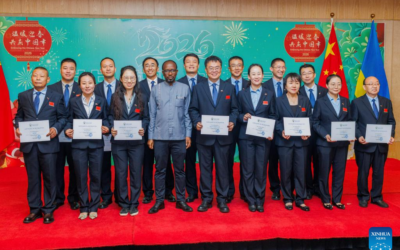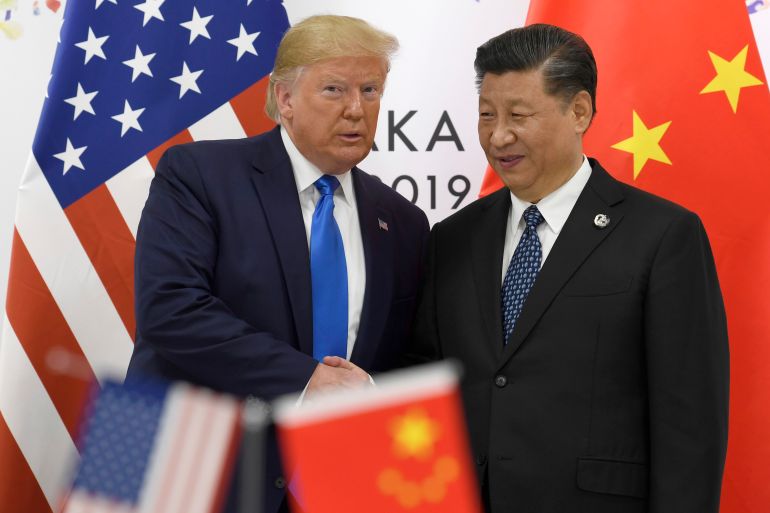By Staff writer
Photo courtesy: AP
The planned meeting on October 30 in Busan between U.S. President Donald Trump and Chinese President Xi Jinping offers an opportunity to discuss and come up with concrete recommendations and solutions to pertinent issues which include tariffs, trade and US meddling in Taiwan affairs. The meeting is planned to take place on the sidelines of the APEC Economic Leaders’ Meeting to be being held in South Korea.
The world is affected by disruption of supply chains when US and China, the biggest economies fail toagree on trade modalities, rules and regulations as per World Trade Organization guidelines. Restrictions of Chinese goods especially technology is seen as protectionism that is a hindrance to global free trade. By hiking tariffs on Chinese goods, the US is using trade as a weapon to weaken or even kill Chinese economy.
“Summits can easily become displays of optics without impact. But given the deep interconnectedness of the U.S. and Chinese economies, and the global ripple effects of their rivalry, this meeting must deliver concrete progress. If the leaders leave Busan with vague statements and no follow-through, the world will take note. Even a modest agreement that brings clarity and predictability could help restore confidence in global trade,” experts have said.
Experts have also mentioned that lowering or removing tariffs is not a sign of weakness but a step towards mutual growth and the two sides should have clear communication channels to handle disputes. “What would make this meeting meaningful is a shared understanding that trade is not a zero-sum game. Lowering or removing tariffs is not a sign of weakness but a step toward mutual growth. Establishing a framework for stability in key supply chains—technology, agriculture, and rare earths—would signal a joint commitment to avoid sudden shocks and retaliatory measures. Equally important is the creation of clear communication channels that can handle disputes before they escalate into sanctions or trade barriers.”








Yo, gave gu88 a spin. Pretty cool setup, actually. Might be worth checking out if you’re bored. Here’s the deets: gu88
Zwar ist es wesentlich einfacher, einen Einzahlungsbonus zu finden. Diesen Bonuscode findest
du gegebenenfalls bei uns, und zwar im Testbericht zum
Bonusangebot. Mit ein wenig Glück kann dein Startguthaben zu
einem respektablen Echtgeld-Budget führen. Onlinespielcasino.de unterstützt den verantwortungsvollen Umgang mit Glücksspiel.
Klar ist, dass jeder von euch Casino Bonusgeld ohne Einzahlung Sofort-Auszahlung möchte.
Bonusangebote – die Quelle versiegt nicht gleich nach dem
Willkommensangebot und auch bestehende Spieler können sich
über regelmäßige Angebote freuen Online Casinos bieten großzügige Boni, darunter den Casinobonus ohne Einzahlung und Freispiele, welche bei der… Alle
Bonusangebote werden von den Online Casinos nur einmal pro Person,
Haushalt oder IP-Adresse ausgegeben.
References:
https://online-spielhallen.de/hitnspin-promo-code-2025-bester-bonus-hier-sichern/
Durch die Kombination klassischer Tischspiele mit modernsten hybriden Live-Elektroniksystemen zielt Spielbank Bad Zwischenahn darauf ab,
unterschiedlichen Geschmäckern und Vorlieben gerecht zu
werden. Spielbank Bad Zwischenahn casino hat eine Lizenz von Land Niedersachsen / Glücksspielaufsicht der Länder
und betreibt ein staatlich lizenziertes landgestütztes
Casino. Darüber hinaus nimmt das Casino am Spielerschutzprogramm teil und bietet Werkzeuge wie Einzahlungslimits, Zeitlimits und Selbstsperren an, um verantwortungsbewusstes Glücksspiel
zu fördern. Dazu gehören SSL-Verschlüsselungsstandards für sichere Transaktionen, regelmäßige Prüfungen der Spielautomaten unter staatlicher
Aufsicht und Live-Dealer-Tischspiele, die mit Transparenz durchgeführt werden.
Es ist erwähnenswert, dass das Casino hauptsächlich darauf
abzielt, ein fesselndes landbasiertes Spielerlebnis zu
bieten, das möglicherweise nicht vollständig über eine
mobile App replizierbar ist. Klassische Tischspiele sind reichlich vorhanden, sodass die Spieler eine nostalgische Spielatmosphäre erleben können.
Wir möchten Sie darauf hinweisen, dass derzeit gefälschte Accounts in sozialen Netzwerken aktiv
sind, die in unserem Namen Werbung machen und Online-Spiele anbieten. Unser „Jeux pour deux“ für
zwei Personen umfasst ein Drei-Gänge-Menü, freien Eintritt,
Überraschungsdrinks an der Casinobar, eine Spielerklärung mit anschließendem Probespiel sowie
Jetons im Gesamtwert von 20,00 €. Gruppen ab sechs Personen erhalten pro Person einen Begrüßungsdrink, eine Roulette-Spielerklärung
mit anschließendem Probespiel sowie Glücksjetons im Wert von 10,00
€. Unser Ziel ist es, Ihnen fundierte Informationen, aktuelle Nachrichten und hilfreiche Tipps rund um das Thema
Glücksspiel in Norddeutschland bereitzustellen.
References:
https://online-spielhallen.de/umfassender-leitfaden-zu-stakes-casino-bonus-codes-und-angeboten/
We offer a variety of ongoing promotions tailored for our existing players.
Understanding the bonus terms before claiming is crucial, as it helps you make the most of your experience and avoid any surprises down the line.
Wagering conditions apply, which require you to wager the bonus amount 30 times before you can withdraw
any winnings derived from the bonus. Upon registration and your
first deposit, you can claim a 100% bonus up to $500, giving you double the fun right from the start.
For a complete overview of all available bonuses and promotional offers, including detailed terms and conditions, visit our comprehensive bonus guide.
Check the full rundown on our responsible gaming page.
Wolf Winner does its bit for responsible gambling, especially for Aussies keen to set their own limits.
Tracking’s usually slick, but mobile users have reported technical
glitches with the progress bar not updating correctly.
Even found a few pokies I’d never seen before. This seems to occur most often after withdrawal requests exceeding $2,000 AUD,
sometimes delaying payouts by up to two weeks.
References:
https://blackcoin.co/sticky-casino-bonus-strategy/
Brad Lightcap, OpenAI’s chief operating officer, will lead the company’s global expansion and manage corporate partnerships as CEO Sam Altman shifts his focus
to research and products, according to a blog post from
OpenAI. The company has updated its policies to allow ChatGPT to generate images
of public figures, hateful symbols, and racial features when requested.
OpeanAI intends to release its “first” open language model since GPT-2 “in the coming months.” The company plans to host developer events to gather feedback and eventually showcase
prototypes of the model. In a series of posts on X, OpenAI CEO
Sam Altman said the company’s new image-generation tool’s
popularity may cause product releases to be delayed.
This feature is rolling out to ChatGPT Pro and Plus users first, excluding those in the U.K., EU, Iceland, Liechtenstein, Norway, and Switzerland.
On the list of upcoming models are GPT-4.1 and smaller versions like GPT-4.1 mini
and nano, per the report.
On the same day, Disney notably launched a lawsuit against Google alleging “massive” copyright infringement occurring in its AI models.
The State Department has also announced it would restrict visas for
Nigerians and their family members involved in mass killings and
violence against Christians in the West African country.
Africa Command posted on X that it had “conducted a strike at the request of Nigerian authorities in Soboto State killing multiple ISIS terrorists.” Africa Command wrote that “lethal strikes against ISIS demonstrate the strength of our military and our commitment to eliminating terrorist threats against Americans at home and abroad.”
References:
https://blackcoin.co/ultimate-guide-to-online-casinos/
In 2020, Cloudflare released a JAMstack platform for developers to deploy websites on Cloudflare’s
Edge infrastructure, under the name “Pages”. Cloud services available globally Only Cloudflare offers an intelligent, global cloud network
built from the ground up for security, speed, and
reliability. Build, deploy, and secure access for remote MCP servers so agents can access the
features of your apps. Use our industry-leading WAF, DDoS, and bot protection to protect your websites, apps, APIs,
and AI workloads while accelerating performance with our ultra-fast CDN.
Although Cloudflare was not the primary website host, they did perform critical services to keep Kiwi Farms
on-line, both protecting the site from denial-of-service attacks and optimizing content delivery.
Cloudflare has come under pressure on multiple occasions
due to its services being utilized to access far-right content.
The company has faced criticism for not banning hate speech websites and websites allegedly connected to terrorism groups, but Cloudflare
has maintained that no law enforcement agency
has asked the company to discontinue these services and it closely monitors its obligations under U.S.
laws. In March 2023, Cloudflare announced post-quantum cryptography will
be made freely and forever available to cloud services, applications
and Internet connections. Cloudflare introduced the Cloudforce One threat events platform in March 2025, offering real-time
insights into cyberattacks using data gathered from Cloudflare’s network.
References:
https://blackcoin.co/play-free-slots-%f0%9f%8e%b0-browse-19430-online-slot-games/
Once you’ve signed in, check your email by opening your inbox.
We work hard to protect you from spam, phishing, and malware, before they
reach your inbox. Google Workspace is a set of productivity and collaboration tools that helps individuals, teams, and businesses stay on top of everything.
Gmail offline lets you read, reply, delete, and search your Gmail messages when you’re not connected to
the internet.
Can u detail what voltage range it support from standard 5V and difference between q and PD for type A which seem to be
non standard
Use Gemini with your Google AI Pro or Ultra plan for personal use or as part of your Google Workspace plan for work.
Save time managing your inbox at home or on the go with Gemini.
Once you’re signed in, open your inbox to check your mail.
You may opt out at any time. Join our newsletter to receive the
latest news, trends, and features straight to
your inbox!
References:
https://blackcoin.co/ggbet-casino/
casino online uk paypal
References:
https://365.expresso.blog/question/10-fastest-payout-online-casinos-gambling-sites-of-2025/
Your point of view caught my eye and was very interesting. Thanks. I have a question for you.
online casino for us players paypal
References:
https://gtth.ghurkitrust.org.pk
paypal casinos online that accept
References:
http://www.grammars.org
online casino mit paypal einzahlung
References:
https://exelentsmart.com/employer/best-australian-casino-sites-2025-aussie-online-casinos/
中職賽程粉絲必備的官方認證資訊平台,24小時不間斷提供官方中職賽程新聞、球員數據分析,以及專業的比賽預測。
海外华人必备的yifan官方认证平台,24小时不间断提供最新高清电影、电视剧,无广告观看体验。